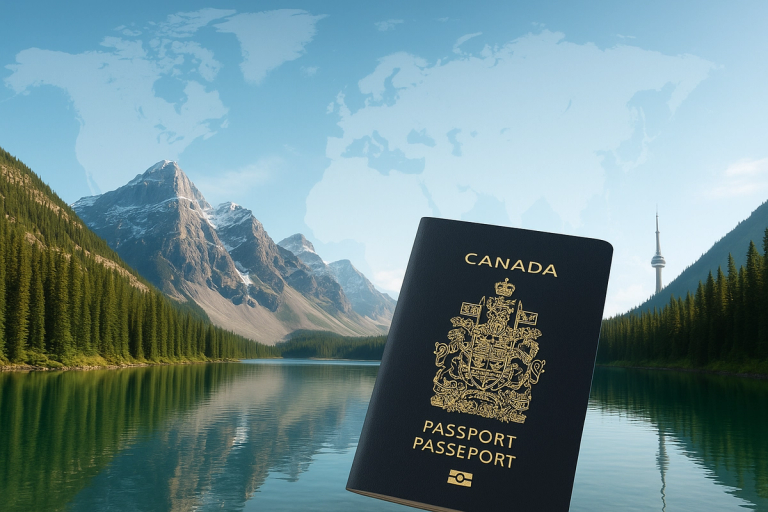Blog • Published on:November 10, 2025 | Updated on:November 10, 2025 • 14 Min
Where Can You Travel Visa-Free with a Canadian Passport in 2025?
The Canadian passport remains one of the most powerful in the world, consistently ranking within the top 10 globally for travel freedom.
As of late 2025, Canadian citizens enjoy visa-free, visa-on-arrival, or eVisa access to 183 countries and territories, based on official government and data.
This extensive access highlights Canada’s strong diplomatic network, membership in the Commonwealth and G7, and participation in key travel frameworks like the Schengen Visa Waiver and the U.S.–Canada Travel Agreement.
For global professionals, investors, and frequent travelers, the Canadian passport offers an ideal balance of mobility, recognition, and access, allowing smooth travel across nearly every major economic region.
Key Snapshot:
Where Can Canadians Travel Visa-Free in 2025?
Canadian citizens can visit 110 destinations completely visa-free, with permitted stays ranging from short business or tourism trips to extended working or study visits.
The exact duration depends on bilateral agreements between Canada and each country.
Short-Stay Visa-Free Access (1–30 days)
Ideal for quick business trips or vacations, these destinations allow entry for up to 30 days without a visa:
- Singapore
- Philippines
- Qatar
- Kazakhstan
- Dominican Republic
- Many of these short-stay destinations offer extensions through local immigration offices, making them convenient for travelers seeking temporary relocation or exploratory visits.
Extended Visa-Free Access (31–90 days)
Most visa-free destinations fall within this category, giving Canadians up to 90 days of stay per entry for tourism, business, or family visits. This includes:
All Schengen Area countries (Portugal, France, Germany, Greece, Italy, etc.)
- Japan
- Malaysia
- Chile
- Turkey
- South Africa
- United Arab Emirates
These countries represent the core of Canada’s travel network, offering smooth entry and generous short-term access under standard passport validity.
Which Countries Offer a Visa on Arrival for Canadians?
While Canada’s passport provides extensive visa-free access, there are still several destinations that require a visa on arrival (VoA), a simple process handled directly at the airport or border.
These visas are typically issued for short-term stays (from 15 to 90 days) and only require travelers to show a valid passport, proof of onward travel, and sometimes accommodation details.
Standard Visa-on-Arrival Countries
Canadian travelers can obtain a visa upon arrival in these destinations, usually for tourism or short business visits:
- Maldives – 30 days on arrival
- Nepal – 90 days on arrival
- Cambodia – 30 days on arrival
- Jordan – 30 days on arrival
- Tanzania – 90 days
- Zimbabwe – 90 days
- Lebanon – 30 days
- Laos – 30 days
These countries allow straightforward entry at airports or designated border crossings, often with only a small visa fee.
eVisa Options
Some destinations operate hybrid systems where travelers can apply online in advance.
Key examples include:
- India – eVisa required before arrival, valid for 30 days .
- Sri Lanka – eTA (Electronic Travel Authorization) pre-approval, valid for 30 days.
- Kenya – eTA 90 days).
- Azerbaijan – ASAN eVisa valid for 30 days.
- Bhutan – Pre-clearance for 90 days.
These options save processing time while maintaining a degree of border control. The systems are digital-first, with approval typically granted within 24 to 72 hours.
Express Entry or Simplified Application Programs
A few countries extend fast-track or express entry privileges to Canadian travelers based on diplomatic or bilateral cooperation:
- United Arab Emirates – automated immigration e-gates for frequent Canadian visitors.
- Australia – ETA (Electronic Travel Authority) system, allowing multiple short visits over 12 months.
These frameworks combine Canada’s global standing with modernized travel systems, ensuring entry remains smooth even when formal authorization is needed.
What Are the Commonwealth Travel Privileges for Canadians?
As a member of the Commonwealth of Nations, Canada enjoys privileged travel and entry arrangements with several fellow member states.
These connections are rooted in historical, diplomatic, and educational cooperation, resulting in simplified entry, extended stays, and reciprocal benefits.
Canadian passport holders benefit from visa-free or simplified visa access to the majority of Commonwealth countries across Africa, Asia, the Caribbean, and the Pacific.
Key Visa-Free Commonwealth Destinations
These shared Commonwealth ties simplify not only tourism but also academic and professional mobility.
For example, graduates from Canadian universities often receive streamlined recognition of qualifications in other Commonwealth nations, and vice versa.
Education and Professional Exchange Benefits
- Commonwealth Scholarship and Fellowship Plan (CSFP): Canadian citizens can apply for postgraduate scholarships in fellow Commonwealth countries.
- Mutual Degree Recognition: Qualifications earned in Canada are widely recognized in the U.K., Australia, and the Caribbean.
- Reciprocal Working Rights: Certain countries, such as the U.K. and Australia, offer Youth Mobility and Work Visa schemes for Canadians under age 35.
The Commonwealth network remains one of the strongest mobility corridors globally, enhancing Canada’s already extensive travel privileges through shared diplomatic and cultural frameworks.
Which Countries Require an eTA for Canadian Travelers?
While most destinations welcome Canadian citizens visa-free, a few have implemented Electronic Travel Authorization (eTA) systems, quick online permits that pre-clear travelers before boarding.
These are not visas in the traditional sense but serve as a digital entry approval, designed to enhance border security while maintaining travel convenience.
Countries Requiring an eTA for Canadian Travelers
These authorizations are simple and inexpensive, typically costing between $5–$30, depending on the country.
Online Application Procedures
- Visit the country’s official eTA or government immigration portal.
- Complete the digital form with passport details and travel purpose.
- Pay the small processing fee using a credit or debit card.
- Receive the eTA confirmation via email (usually within hours).
Travelers should ensure their passport is valid for at least 6 months beyond the date of entry, as eTAs are automatically linked to the passport number.
Processing Times and Validity Periods
Most eTAs remain valid for multiple entries over one or two years, allowing flexibility for frequent travelers.
However, authorities may revalidate or suspend authorization if the traveler’s passport expires or a security alert arises.
Tip: Always apply at least 72 hours before departure to avoid airline check-in issues.
Which Countries Still Require a Visa for Canadians in 2025?
Despite Canada’s wide global mobility, a handful of nations still require traditional pre-arranged visas for entry.
These typically involve in-person or mail-in applications submitted through an embassy or consulate before departure.
These destinations are often governed by geopolitical, security, or reciprocal visa policies, meaning they require advance documentation and approval even for short visits.
Most Common Visa-Required Countries for Canadian Citizens
While requirements may vary, most embassies ask for:
- A valid passport (minimum 6 months validity)
- Completed visa application form
- Passport-sized photos
- Proof of accommodation and return flight
- Evidence of sufficient financial means
- Invitation letter (for business or family visits)
Embassy Application Requirements
Applicants must generally schedule an appointment at the relevant embassy or visa center.
In some cases (like Russia or China), biometric data and in-person interviews are mandatory.
Tips for Canadian travelers:
- Apply at least one month before travel, especially during high seasons.
- Always confirm the latest fee structure and required documentation on the official embassy website.
- Keep copies of all documents, including the visa approval letter, when traveling.
Advance Planning Guidelines
- Check entry requirements early. Some visas have multi-stage approvals or require invitation letters.
- Ensure passport validity at least six months beyond intended return date.
- Book refundable travel until the visa is issued.
- Monitor geopolitical updates. Visa rules can shift quickly due to diplomatic relations.
What Are Canada’s Regional Travel Privileges Under CUSMA and NAFTA?
Canada’s position within North America provides its citizens with some of the most seamless regional travel privileges in the world.
Through bilateral and multilateral frameworks like CUSMA (Canada–United States–Mexico Agreement),
Canadians benefit from simplified border procedures and extended business mobility.
Travel Privileges Between Canada and the United States
Canadian passport holders enjoy one of the world’s strongest reciprocal travel relationships with the U.S.:
- Visa-Free Entry: Canadians can enter the United States without a visa for up to six months for tourism or business purposes.
- No ESTA Required: Unlike other countries under the Visa Waiver Program, Canadians do not need to apply for an ESTA.
- Land, Air, and Sea Entry: Travel is permitted through any U.S. port of entry, including air, sea, or land borders.
- Work and Study Exceptions: Separate documentation is required for employment or formal study, such as an approved TN work visa or F-1 student visa.
This unmatched level of cross-border access reflects both nations’ close diplomatic and economic partnership.
CUSMA (formerly NAFTA) Mobility Benefits
Under CUSMA, Canadians benefit from a streamlined process for temporary business or professional activities in the U.S. and Mexico.
Key advantages include:
- Simplified TN Visa: Professionals in over 60 eligible occupations (e.g., engineers, consultants, IT specialists) can obtain a TN visa directly at the border or airport.
- Temporary Business Visitors: Canadians may enter both the U.S. and Mexico for trade, meetings, or negotiations without a full work visa.
- Intra-Company Transfers: Senior managers and specialized employees can transfer between company branches more easily.
Validity: TN and business entry privileges are typically granted for up to 3 years, renewable.
Travel Between Canada and Mexico
Canada and Mexico maintain reciprocal visa-free access for tourism, short business visits, and family stays:
- Visa-Free Stay: Up to 180 days.
- eTA Equivalent: Canadians must complete a Forma Migratoria Múltiple (FMM) on arrival or online before entry.
- Special Business Access: Under CUSMA, Canadian investors and professionals benefit from simplified business entry categories.
These agreements make North America one of the most integrated mobility zones globally, allowing Canadians to live, work, and travel across borders with minimal bureaucracy, a privilege shared by very few nationalities worldwide.
Can Canadians Still Travel Visa-Free to Europe and the U.K.?
Europe remains one of the most popular destinations for Canadian travelers, not only for tourism, but also for business, education, and relocation.
As of 2025, Canadian citizens continue to enjoy visa-free access to all 27 Schengen Area countries, along with separate arrangements for the United Kingdom and Ireland.
How Long Can Canadians Stay in the Schengen Area?
The Schengen Zone includes major European destinations such as France, Germany, Portugal, Spain, Italy, Greece, and the Netherlands.
Canadian citizens can enter the Schengen Area without a visa for up to 90 days within any 180-day period.
Key rules and benefits:
- Valid for tourism, family visits, and business travel.
- No additional registration required for short stays.
- Travel freely between Schengen states without internal border checks.
- Must have a passport valid for at least 3 months beyond the planned exit date.
Upcoming Change:
In late 2026, the ETIAS (European Travel Information and Authorization System) is expected to take effect.
Once active, Canadian citizens will need to register online before travel, similar to the U.S. ESTA system.
ETIAS will be inexpensive ( €20) and valid for three years, with approval typically granted within minutes.
What Are the New U.K. Rules for Canadian Travelers?
Canada and the U.K. maintain one of the strongest bilateral travel relationships outside the Commonwealth framework.
Canadian citizens can enter the United Kingdom for up to six months for tourism, family visits, or business purposes.
For extended stays or work/study purposes, travelers must apply for the appropriate visa category (e.g., Skilled Worker, Student Visa).
The U.K. Electronic Travel Authorization (ETA) system, which started rolling out in 2024, is expected to become mandatory for Canadians by late 2025.
This online authorization will replace landing card procedures and mirror systems like ETIAS and ESTA, ensuring faster digital processing.
Entry Highlights:
- Short visits allowed for up to 6 months
- ETA approval will soon be mandatory for air and sea arrivals
- Full right to study short courses without a student visa (up to 6 months)
Ireland Travel Rights
Ireland, though not part of Schengen, allows visa-free stays for up to 90 days.
It also maintains strong academic and professional recognition agreements with Canada under the Common Travel Area (CTA) with the U.K.
Best For:
- Tourists and business travelers seeking long-stay flexibility in Europe.
- Families planning education or dual-residency between EU and Commonwealth regions.
Where Can Canadians Travel Visa-Free in the Caribbean and Pacific?
Canadian citizens enjoy exceptionally broad travel access across both the Caribbean and Pacific regions, two areas that have historically maintained close ties with Canada through tourism, trade, and the Commonwealth.
These destinations are popular among retirees, digital nomads, and investors seeking lifestyle-based relocation options, often supported by visa-free or extended-stay arrangements.
Caribbean Nations Entry Policies
Canadian travelers can access nearly all Caribbean island nations visa-free, with stays typically ranging from 90 to 180 days.
These visa exemptions make the Caribbean a top-tier short-term relocation and second-home market for Canadian citizens, particularly for retirees or remote professionals seeking tropical residency.
Pacific Islands Entry Policies
The Pacific region, including Oceania and smaller island states, also grants visa-free or visa-on-arrival access to Canadians.
Best For:
- Canadians seeking second-home or lifestyle investment opportunities.
- Long-term travelers combining tourism with business or volunteer projects.
These entry privileges underscore the global strength of the Canadian passport, allowing its holders to move freely across some of the most exclusive island economies in the world.
What Should Canadians Know Before Traveling Abroad in 2025?
Although Canadian travelers enjoy one of the most powerful passports globally, certain seasonal, regional, and health-based restrictions still apply.
Understanding these nuances helps ensure smooth travel, particularly when planning long stays or multi-country itineraries.
Are There Seasonal or Regional Entry Restrictions?
Some countries impose entry limits or seasonal restrictions due to climate, tourism flow, or local capacity:
- Bhutan – Tourist entry is regulated through licensed operators and limited daily quotas, especially during festival months.
- Maldives – Overstaying tourist visas during peak season may result in penalties or future entry bans.
- Indonesia (Bali) – Tourist overstays are fined daily; certain regions may impose “visitor caps” during major holidays.
- European Schengen Area – Canadians must track their 90/180-day rule carefully to avoid overstays, which can lead to temporary bans.
Tip: Use the EU’s online “short-stay calculator” to plan Schengen visits accurately.
Do Canadians Need Vaccinations or Health Certificates?
Some destinations require specific vaccinations or health certificates for entry:
- Yellow Fever: Required when traveling from or transiting through affected countries, notably in parts of Africa and South America.
- Polio & Measles: Proof of vaccination may be requested in countries with active eradication programs.
- COVID-19: As of 2025, most nations have lifted pandemic-related restrictions, though proof of vaccination or testing may still be needed in select regions.
Always check the Government of Canada’s official travel health notices before departure.
Travel Insurance and Emergency Coverage
Comprehensive travel and medical insurance is strongly advised, as many countries now require proof of coverage for entry.
This is especially relevant for:
- Schengen countries (minimum €30,000 medical coverage)
- UAE and Qatar (mandatory visitor insurance since 2024)
- Thailand and Malaysia (recommended for long-stay visas)
Best Practice: Always confirm insurance validity for the specific countries visited, as regional exclusions may apply.
Global Mobility Overview for Canadian Citizens
The Canadian passport remains one of the world’s most powerful travel documents, offering visa-free, visa-on-arrival, or eVisa access to 183 countries and territories in 2025.
This global mobility allows Canadian citizens to travel, invest, study, and retire across nearly every continent with minimal bureaucracy.
However, each region carries its own rules and nuances, from Schengen’s short-stay limits to the U.K.’s new ETA system and the Pacific’s visa-on-arrival flexibility.
Understanding these distinctions ensures seamless travel planning, whether for leisure or long-term relocation.
For those considering expanding beyond travel, into residency or citizenship by investment, programs in destinations like Portugal, Malta, Saint Kitts and Nevis, and the UAE offer extended living rights and global access advantages.
Savory & Partners provides expert guidance on these options, ensuring each decision aligns with your long-term mobility goals.
FAQs on the Canadian Passport and Global Mobility
1. How many countries can Canadians visit without a visa?
As of 2025, Canadian citizens can visit183 countries and territories visa-free, with visa-on-arrival or eVisa access included.
2. Do eVisa destinations count as visa free?
Yes, because they offer simplified online entry approval instead of traditional consular processing.
3. How long can Canadians stay in the Schengen Area?
Canadians can stay up to 90 days within any 180-day period without a visa. Longer stays require a national or residence visa.
4. When will ETIAS become mandatory for Canadians visiting Europe?
ETIAS (European Travel Information and Authorization System) is expected to go live in late 2026. Once active, Canadians will need to complete a short online registration before travel.
5. Which countries require a traditional visa for Canadians?
As of 2025, major destinations requiring pre-arranged visas include China, Russia, Iran, Nigeria, and Algeria.
Requirements may change, so travelers should always confirm with the respective embassy before departure.
6. Can Canadians work abroad without a visa?
Not by default. While short-term business visits are allowed, employment or paid activity usually requires a work visa or permit, even within visa-free countries.
7. Do Canadians need an ESTA or eTA to visit the United States?
No. Canadians are exempt from the ESTA requirement and may enter the U.S. visa-free for up to six months for tourism or business.
References
Government of Canada – Travel Advice and Advisories. Referred from: https://travel.gc.ca/travelling/advisories
European Commission – ETIAS Travel Authorization. Referred from: https://travel-europe.europa.eu/etias_en
U.S. Department of State – Visa Waiver and Entry for Canadians. Referred from: https://travel.state.gov/
Wikipedia – Visa Requirements for Canadian Citizens. Referred from: https://en.wikipedia.org/wiki/Visa_requirements_for_Canadian_citizens
Written By

Alice Emmanuel
Alice Emmanuel is an expert in residency and citizenship by investment, specializing in government compliance and program optimization. With over 8 years of experience, she has guided high-net-worth individuals through acquiring global mobility and new citizenships, particularly in Europe, the Caribbean, and the Middle East. Alice's in-depth knowledge of Middle Eastern residency programs makes her a trusted advisor for investors seeking security and diversification in the region.
Related Articles









Recently Published









Book a free consultation


